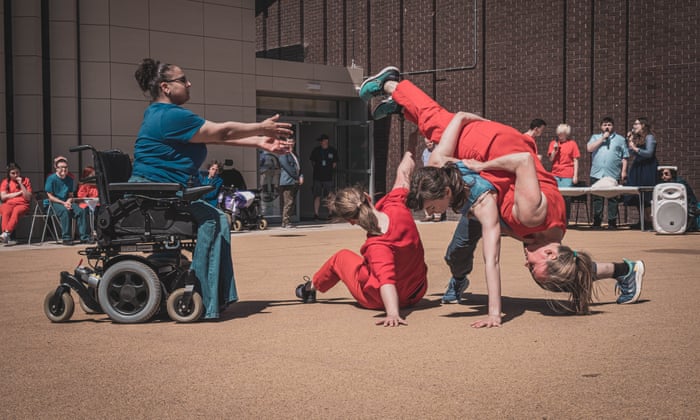Community, Leadership, Experimentation, Diversity, & Education
Pittsburgh Arts, Regional Theatre, New Work, Producing, Copyright, Labor Unions,
New Products, Coping Skills, J-O-Bs...
Theatre industry news, University & School of Drama Announcements, plus occasional course support for
Carnegie Mellon School of Drama Faculty, Staff, Students, and Alumni.
CMU School of Drama
Wednesday, April 19, 2023
‘Disabled children need to know it is an option’: co-creating the future of dance
Stage | The Guardian: Several adults form a circle in a community hall, swerving their bodies and linking arms. One spirals around a chair, using it as part of their movement. This is Breakthrou’dance, a group in Stoke-on-Trent for disabled participants. They come together each week to do what Frontlinedance founder Rachael Lines calls “dancing with”, rather than the traditional model of following an instructor.
Subscribe to:
Post Comments (Atom)

4 comments:
Dance is something that is crucial to emotional and physical growth and kids with disabilities should have access to that right as they are growing up. There is a reason that most kids are in ballet, tap or jazz as a kid. Dancing and storytelling through your body is crucial to both physical and emotional development. There are many accommodations that can be made in dance classes to make them more accessible. Classes for kids in wheelchairs can easily be built. Dance can be taught to those with visual impairments with changes in teaching style. I have friends who have disabilities and with a few accommodations and some patients that can learn dance and other forms of movement art with their peers. Without these accommodations it is hard to learn dance or movement as they are needed for kids with disabilities to fully participate in classes. With a little time and patients accommodating others is not that hard.
Theo
After having multiple conversations this week about how to normalize disabilities in theatre and make performing with a disability more equitable, this article is enlightening. I am inspired that Rachel Line has been able to create a dance group called Breakthrou’dance that allows people with disabilities to express themselves through dance and performances. I am hopeful that the theatre community will start making changes so that the disability community can become more recognized and normalized in the theatre industry. With theatre becoming more prevalent in different communities it is now a conversation about how to create an industry and community that is accessible for all and works to create equitable spaces for everyone to work, perform and live in. I am excited to see that there are more companies leading the way towards progress and working towards creating a community that helps lift up people and encourage them to perform, dance, and be their lively selves whenever they can and especially in theatre.
I’ve worked with a theatre company in Kansas CIty called Spinning Tree. Their mission is to emphasize inclusion with casting and hiring. I love watching their shows because I get to see people of all different backgrounds, ages, identities, and abilities, which is really what theatre is all about. What Frontline Dance is doing is what I want to see so much more of in the world of dance and performance. Their model of creating art through movement by “working with” and not “for” is something I haven’t seen a lot of before. WHen you have a group of people of all different abilities, the typical model of following what an instructor tells you doesn’t really apply well. When the creative process is shared between everyone, it fosters a community experience and, in my opinion, produces a much more meaningful product. I’ve been learning about the “process over product” mindset and I think this is a great example of that.
This article from the title alone, brought up so many important discussions that we need to have about the way in which people with disabilities are treated within our society, especially within children and the way the performing arts industry specifically ostracize such individuals. I love the line in the article that says, “ making work with people, rather than telling them what to do it’s a concept, many arts organizations in for.” Rather than dismissing or seeing one’s disabilities as an obstacle this organization sees it as a way to explore various movements and themes within dance. The arts are for everyone and I am happy to see that your organization, such as this one that is expressing this. Breaking down the negative ideologies people hold about disabled people is key to opening spaces for those with disabilities. I would absolutely love to support organization, such as this one ones that wish to emerge.--
Post a Comment